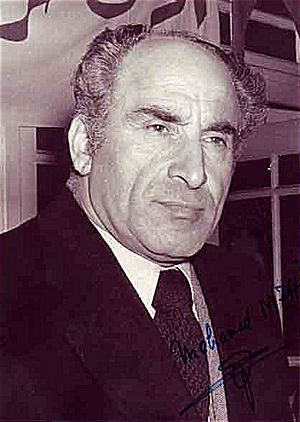Mohammed Mzali facts for kids
Quick facts for kids
Mohamed Mzali
محمد مزالي |
|
|---|---|
 |
|
| Prime Minister of Tunisia | |
| In office 23 April 1980 – 8 July 1986 |
|
| Preceded by | Hédi Amara Nouira |
| Succeeded by | Rachid Sfar |
| Personal details | |
| Born | 23 December 1925 Monastir, Tunisia |
| Died | 23 June 2010 (aged 84) Paris, France |
| Political party | Socialist Destourian Party |
| Spouse | Fethia Mzali (1950–2010) |
Mohammed Mzali (Arabic: محمد مزالي, born December 23, 1925 – died June 23, 2010) was an important Tunisian politician. He served as the Prime Minister of Tunisia from 1980 to 1986.
Contents
Early Life and Education
Mzali was born in Monastir, Tunisia on December 23, 1925. His family came from the Ait Mzal tribe, a Berber group from the Sous region of Morocco. Their ancestor settled in Tunisia in the late 1600s after returning from the Hajj, a pilgrimage to Mecca.
Mzali went to Sadiki College in Tunis. He later studied at the Faculty of Humanities at Sorbonne University in Paris, France. While in France, he was the vice president of the Federation of Destourian Students from 1949 to 1950. He also took part in groups that discussed literature. In 1955, he helped start a literary magazine called Al-Fikr with Béchir Ben Slama.
Political Career
Starting Out in Politics
Mzali was a member of the Socialist Destourian Party. This was a major political party in Tunisia. He began holding different government jobs in the late 1950s. These roles prepared him to become prime minister later on.
He was first chosen to be a member of Parliament in 1959. He was re-elected many times after that. Some of his early national jobs included:
- General Director for Youth and Sport
- Founding Director of the Tunisia Radio and Television Company
- Minister of Defence
- Minister of Youth and Sport
- Minister of National Education
- Minister of Public Health
- Minister of Interior
Mzali was Tunisia's Minister of Education three times in the 1970s. During his time in this role, he supported making Arabic more widely used in Tunisia. He also wanted Tunisia to have stronger ties with countries in the Gulf region, like Saudi Arabia.
As Prime Minister
President Habib Bourguiba chose Mzali to be the Prime Minister of Tunisia on April 23, 1980. In December 1983, the government removed money that helped keep the price of flour and bread low. This decision was made because of pressure from the International Monetary Fund, an organization that helps countries with their money problems.
This change led to protests known as the Tunisian bread riots. The government's security forces tried to stop the protests. On January 6, 1984, President Bourguiba announced that the price increase for bread and flour was cancelled. He made it seem like Mzali had not been given permission to raise prices.
The way the price increase was handled hurt Mzali's standing. Many people had thought he would become the next president after Bourguiba. Mzali temporarily took on the role of Minister of the Interior. To try and regain public support, Mzali visited different parts of the country after the protests. He promised new projects to create jobs. He also said that a key lesson from the January events was to improve how security forces respond to situations.
After Being Prime Minister
Mzali was removed from his position in 1986. He then left Tunisia and went to live in France. Rachid Sfar took over as Prime Minister. Mzali wrote many books, including one called "Un Premier ministre de Bourguiba témoigne" (A Prime Minister of Bourguiba Testifies). He was also a member of the International Olympic Committee from 1965 until he passed away.
Personal Life
Mzali met Fethia Mokhtar when they were both students in Paris. They got married in 1950. They had six children together. Fethia Mokhtar also became a politician and served as Tunisia's Minister for Women from 1983 to 1986.
Mohammed Mzali died on June 23, 2010, in Paris, France.
Sources
- Entelis, John Pierre (1997). Islam, Democracy, and the State in North Africa. Indiana University Press. p. 98. ISBN 0-253-21131-X. https://archive.org/details/islamdemocracyst00john. Retrieved 2015-05-13.
- Gana, Nouri (2013). The Making of the Tunisian Revolution: Contexts, Architects, Prospects. Oxford University Press. ISBN 978-0-7486-9103-6. https://books.google.com/books?id=YJilBgAAQBAJ&pg=PA22. Retrieved 2015-05-13.
- Lief, Louise (10 January 1984). "Tunisia's riots pose troubling questions". Christian Science Monitor. http://www.csmonitor.com/1984/0110/011041.html. Retrieved 2015-05-12.
- Mzali, Mohamed Mzali (2004). Un Premier ministre de Bourguiba témoigne. Paris: Jean Picollec.
- Walton, John K.; Seddon, David (2008-09-15). Free Markets and Food Riots: The Politics of Global Adjustment. John Wiley & Sons. ISBN 978-0-470-71271-9. https://books.google.com/books?id=-ToJRrbI1ygC&pg=PA87. Retrieved 2015-05-13.
See also
 In Spanish: Mohamed Mzali para niños
In Spanish: Mohamed Mzali para niños
 | James B. Knighten |
 | Azellia White |
 | Willa Brown |

